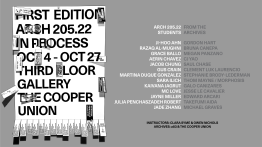First Edition: ARCH 205.22 in Process
Wed, Oct 4, 5pm - Fri, Oct 27, 2023 12pm

The analog/digital dichotomy is perpetuated by nostalgic narratives and technological fetishism, when in fact there are a multitude of tools, machines, and techniques between these two modes of production. First Edition, a course taught by Owen Nichols and Clara Syme, focuses on printmaking as a method for constructing architectural images that evades these two deceptively neat categories. The exhibition First Edition: ARCH 205.22 in Process presents student work from the course, specifically from its first two assignments.
A guiding principle for the semester is that the construction of images is integral to the design process. The course examines primary visual sources in the form of architectural prints, drawings, and hybrid media. Students are performing close readings of images—discerning the techniques, tools, and materials used in the construction of the works—while developing an understanding of the context in which they were produced. Simultaneously, students are working on their own representational projects in the printmaking studio, providing an opportunity to explore concepts through the production of a series of prints.
Nostalgia is to be avoided. Instead, the course explores how constructing architectural graphics through an expanded repertoire of image-making techniques can be operative within contemporary design culture. Experimental representation (the kind you always wanted to do but never had time for) is prioritized.
The course is run as a hybrid between a discussion-based seminar and a demonstration-based workshop. Physical demonstrations of printmaking techniques and access to printmaking equipment are located at a83’s print studio at 83 Grand Street. Short lectures, presentations, and class discussions on topics relevant to the course theme are conducted at Cooper in a classroom setting.
The primary course objective is to expose students to a wider range of image making techniques while providing them with the opportunity to put this knowledge into practice within the context of their own representational and design projects. Lectures and readings broaden their understanding of the history and theory of architectural image making. Demonstrations and print-studio access provide hands-on opportunities for students to engage with printed artifacts and print technology. Engaging with architectural work in the context of an archive provides students with the experience of learning from primary sources by conducting their own research which prioritizes attention to details and the development of a concentrated line of inquiry. Course topics related to the curation and presentation of architectural drawings encourage students to think critically about the display of images, whether in an exhibition, publication, or professional setting.
On Thursday, October 26 at 6:30 pm Syme, Nichols, and their students will hold gallery remarks for the exhibition in the Third Floor Hallway.
Open to Cooper Union students, faculty, and staff. 
Exhibitions and events presented by The Irwin S. Chanin School of Architecture Archive are made possible by the New York State Council on the Arts with the support of the Office of the Governor and the New York State Legislature.
Located at 7 East 7th Street, between Third and Fourth Avenues




